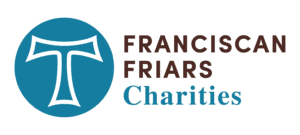Like ocean vessels have lighthouse beacons to help guide them through rough waters, migrant families have their own beacon of light when they arrive at the Port Authority bus depot in Manhattan. It’s called The Migrant Center of New York, where they are welcomed by Franciscan friars with food, clothing and compassion at this beacon of hope on West 31st Street.
“Thanks to the help of the friars, my wife and I are relieved that we have enough food. Without the friars and The Migrant Center, we would be hungry because we can’t support ourselves. We thank the friars for what they are doing for us and for all migrants,” said Cleiber, who made a harrowing 40-day journey with his pregnant wife from their native Venezuela through terrain rife with hazards, culminating in a two-day bus ride from El Paso, Texas, to New York City.
Despite the uncertainties of shelter and employment – and the new culture and language barrier – awaiting them on the other side of their journey, these new migrants say the risks of leaving behind everything, and making the dangerous trek, are worth escaping the extreme poverty, institutional and domestic violence, political and religious persecution, and exploitation by organized crime and drug cartels in their homelands.
Although they came from the same region of Ecuador, Alexandria and Valeria’s families didn’t know each other until they met at The Migrant Center. Their path to the U.S. ran parallel – Alexandria, her husband and their three young children, and Valeria and her two young daughters, journeying 3,000 miles, mostly on foot and hitching rides with strangers, going days with little food, and abandoning their belongings all for the chance at a new life.
The stories of how they got here vary, but the common thread that connects these families, and hundreds of others, is The Migrant Center, a ministry inspired more than a decade ago by the Franciscan tradition of caring for the poor, marginalized and alienated. For migrants who arrive with their life’s possessions in a backpack, it is their lighthouse beacon that provides food, clothing, school supplies, and other humanitarian care and basic life necessities.

When two brothers stopped at the daytime drop-in facility at The Migrant Center because they were hungry and cold – they were wearing shorts and flip-flops on a chilly autumn day – they couldn’t contain their excitement when they left with sweatshirts, coats, and extra sandwiches for their younger sister. Their parents returned with them the next day and the family, which lives at a nearby migrant hotel, has been receiving help ever since.
The friars initiated the daytime drop-in facility a year ago as part of The Migrant Center ministry after identifying the need to provide food and clothing assistance to the recently arrived. Guests are offered sandwiches, fruit, cookies, juice, and shoes, boots, sweaters, coats and other warm clothing – all new – for the winter months.
“Our reputation is that we are a place of welcome, where we treat everyone with dignity and respect. The migrant crisis requires a compassionate and complete response. We must approach it with a Franciscan heart,” says Julian Jagudilla, OFM, director of The Migrant Center, who noted that outreach efforts are adjusted to focus on real-time needs.

For example, when the first buses arrived from Texas, the friars, noticing a significant influx of children, launched a fundraising drive for backpacks and school supplies. They shifted the campaign to basic hygiene items, then to seasonal clothing.
“If The Migrant Center and friars weren’t here to help us, my daughters and I wouldn’t have anywhere else to turn,” says Valeria. “We would be cold and hungry. They save our lives every day that they help us.”
“I thank God my family found the Franciscan friars and good people to help us. We had nothing when we got here – nothing, not even clothes. We are grateful to the friars,” says Alexandria.
A staff of trained counselors assist migrants on various issues, such as securing identification cards, identifying employment opportunities,
connecting them to housing and healthcare, reuniting parents and children, and helping families navigate available social services and resources from government agencies and non-profit organizations.
The Migrant Center offers a pool of immigration attorneys and paralegals who provide mostly pro bono services related to asylum application, civil and human rights issues, employment authorization, deferred action for childhood arrivals, citizenship, and other legal forms and filings. They often provide free education workshops on immigration and DACA rights, and a course for staff and volunteers of immigration advocacy organizations. Staffers also organize orientation meetings for visits to local immigration detention centers.
With Christmas approaching, The Migrant Center doesn’t have any big plans. The light of Christmas and the spirit of giving happens every day for migrants at the beacon of hope on 31st Street.
Content for this article compiled and written by Steve Mangione.



